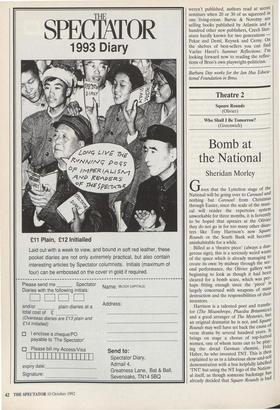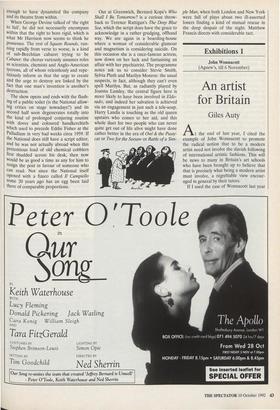Theatre 2
Square Rounds (Olivier)
Who Shall I Be Tomorrow? (Greenwich)
Bomb at the National
Sheridan Morley
Given that the Lyttelton stage of the National will be going over to Carousel and nothing but Carousel from Christmas through Easter, since the scale of the musi- cal will render the repertoire system unworkable for three months, it is fervently to be hoped that upstairs at the Olivier they do not go in for too many other disas- ters like Tony Harrison's new Square Rounds or the South Bank will become uninhabitable for a while.
Billed as a 'theatre piece' (always a dan- gerous sign), this is a seriously weird waste of the space which is already managing to create its own: by midway through the sec- ond performance, the Olivier gallery was beginning to look as though it had been cleared for a bomb scare, which was per- haps fitting enough since the 'piece' is largely concerned with weapons of mass destruction and the responsibilities of their inventors.
Harrison is a talented poet and transla- tor (The Misanthrope, Phaedra Britannica) and a good arranger of The Mysteries, but an original dramatist he is not, and Square Rounds may well have set back the cause of verse drama by several hundred years. It brings on stage a chorus of top-hatted women, one of whom turns out to be plaY" ing the dread German chemist, Fritz Haber, he who invented TNT. This is then explained to us in a laborious show-and-tell demonstration with a box helpfully labelled `TNT' but using the NT logo of the Nation- al itself, as though someone backstage has already decided that Square Rounds is bad
enough to have dynamited the company and its theatre from within.
When George Devine talked of 'the right to fail', he did not necessarily encompass within that the right to bore rigid, which is what Mr Harrison now seems to think he possesses. The rest of Square Rounds, run- ning rapidly from verse to worse, is a kind of sub-Brechtian cabaret trying to be Cabaret: the chorus variously assumes roles as scientists, chemists and Anglo-American tycoons, all of whom relentlessly and repe- titiously inform us that the urge to create and the urge to destroy are linked by the fact that one man's invention is another's destruction.
The show opens and ends with the flush- ing of a public toilet (is the National allow- ing critics on stage nowadays?) and its second half soon degenerates totally into the kind of prolonged conjuring routine with doves and coloured handkerchiefs which used to precede Eddie Fisher at the Palladium in very bad weeks circa 1959. If the National does still have a script editor, and he was not actually abroad when this pretentious load of old chemical cobblers first thudded across his desk, then now Would be as good a time as any for him to resign the post in favour of someone who can read. Not since the National itself Opened with a fiasco called 11 Campiello some 20 years ago has an egg been laid there of comparable proportions.
Out at Greenwich, Bernard Kops's Who Shall I Be Tomorrow? is a curious throw- back to Terence Rattigan's The Deep Blue Sea, which the script does have the grace to acknowledge in a rather grudging, offhand way. We are again in a boarding-house where a woman of considerable glamour and magnetism is considering suicide. On this occasion she is a once-famous actress, now down on her luck and fantasising an affair with her psychiatrist. The programme notes ask us to consider Stevie Smith, Sylvia Plath and Marilyn Monroe: the usual suspects, in fact, although they can't even spell Marilyn. But, as radiantly played by Joanna Lumley, the central figure here is more likely to haye been involved in Eldo- rado, and indeed her salvation is achieved via an engagement in just such a tele-soap. Harry Landis is touching as the old queen upstairs who comes to her aid, and this whole duet for two people who can never quite get out of life alive might have done rather better in the era of Owl & the Pussy- cat or Two for the Seesaw or Rattle of a Sim-
ple Man, when both London and New York were full of plays about two ill-assorted loners finding a kind of mutual rescue in the deep despair of the night. Matthew Francis directs with considerable tact.



























































 Previous page
Previous page